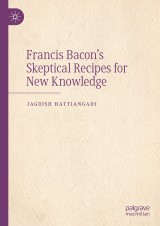Details

Francis Bacon's Skeptical Recipes for New Knowledge
|
CHF 153.50 |
|
| Verlag: | Palgrave Macmillan |
| Format: | |
| Veröffentl.: | 30.03.2024 |
| ISBN/EAN: | 9783031525858 |
| Sprache: | englisch |
Dieses eBook enthält ein Wasserzeichen.
Beschreibungen
<p>The book sets an ambitious goal. It devises a new account of scientific methodology that makes it possible to explain how scientists manage, at least occasionally, to find true models of reality. The new methods may be contrasted with all those currently available that employ “coherence theories” of knowledge. Under this designation are grouped positions that can seem very different (such as those of Poincaré, Duhem, Popper, Hempel, Quine, Kuhn, and Feyerabend) but are united by the idea that the most general statements of science are merely hypotheses. They may be conjectures, opinions, conventions, posits, paradigms, or even myths. The most we can claim to know from such generalities is that they are internally consistent and coherent with empirical data. Consistency is insufficient to establish the truth of a conceptual system because many different systems, perhaps an infinite number, can be logically consistent and cohere with recorded data. Such is the well-known problemof the empirical under-determination of theories. <i>Francis Bacon’s Skeptical Recipes for New Knowledge</i> suggests a new methodology that solves this fundamental problem of knowledge.<br></p>
<p>Chapter 1, Logical Doubts Concerning Induction.- Chapter 2, Socrates and the Skeptical Craft.- Chapter 3, The Active Fallibilism of a Situational Skeptic.- Chapter 4, Pyrrhonian, a School of Skeptics.- Chapter 5, Freedom by Confinement.- Chapter 6, The Sphinx.- Chapter 7, Evidence and Its Refutation.- Chapter 8, Francis Bacon’s <i>Elenchus.- </i>Chapter 9, A Mathematical Method for Physics.- Chapter 10, A Foundational Skepticism.- Chapter 11, Applying the Foundational Method.- Chapter 12, Applying The Experimental Philosophy.</p>
<p><b>Jagdish Hattiangadi</b> is Professor of Philosophy at York University, Canada.</p>
<div>The book sets an ambitious goal. It devises a new account of scientific methodology that makes it possible to explain how scientists manage, at least occasionally, to find true models of reality. The new methods may be contrasted with all those currently available that employ “coherence theories” of knowledge. Under this designation are grouped positions that can seem very different (such as those of Poincaré, Duhem, Popper, Hempel, Quine, Kuhn, and Feyerabend) but are united by the idea that the most general statements of science are merely hypotheses. They may be conjectures, opinions, conventions, posits, paradigms, or even myths. The most we can claim to know from such generalities is that they are internally consistent and coherent with empirical data. Consistency is insufficient to establish the truth of a conceptual system because many different systems, perhaps an infinite number, can be logically consistent and cohere with recorded data. Such is the well-known problem of the empirical under-determination of theories. <i>Francis Bacon’s Skeptical Recipes for New Knowledge</i> suggests a new methodology that solves this fundamental problem of knowledge.<br></div><div><br></div><div><b>Jagdish Hattiangadi</b> is Professor of Philosophy at York University, Canada.<br></div>
Devises a new account of scientific methodology to show how scientists sometimes manage to find true models of reality Contrasts this new methodology with 'coherence theories' of knowledge Suggests a new solution to the empirical under-determination problem

















